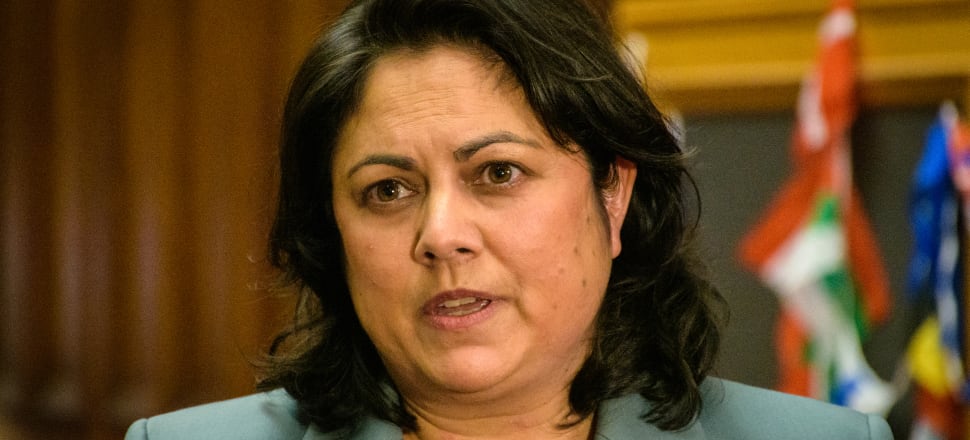
Ministers were told that removing the mask requirement on public transport would increase hospital admissions by a quarter and disproportionately hit Māori and Pasifika, Marc Daalder reports
The country’s top public health official recommended the mask mandate remain in place for public transport and other close contact situations but ministers overrode him, according to an August health briefing.
The document, proactively released by the Ministry of Health, shows officials largely backed the moves to scrap the traffic light system, reduce requirements at the border and remove isolation rules for household contacts. It was produced in late August to inform Cabinet's decision-making about the long-term management of Covid-19.
Dr Andrew Old, the head of the Public Health Agency and the official in charge of the Covid-19 response since Ashley Bloomfield stepped down, recommended in the briefing that masks be retained on public transport even after the traffic light system was ditched.
“Retaining mask requirements in essential close contact (e.g. public transport) and healthcare settings is commensurate with the changing risk profile,” he wrote.
“Modelling provided after the PHRA suggests that removing mask mandates and quarantine requirements for household contacts at the same time could increase infections and hospitalisations by 50-55 percent in the short-term, compared with only a 22-25 percent increase if household quarantine were removed and mask mandates were maintained.”
Masks in retail were less important as evidence indicated these environments didn't see a lot of transmission.
Ayesha Verrall, the Covid-19 Response Minister, told Newsroom after this story was first published that Cabinet "has to take advice in the round, including whether it's feasible and can be enforced".
She said fatigue with the mandates would jeopardise the efficacy of mask requirements if they needed to return in the future.
Old said mask use was a “highly useful ‘Covid legacy’” behaviour that should be maintained into the future. If mandates were axed, that legacy might be jeopardised.
While some might see the removal of mandates as boosting freedoms, Old countered that “it may have the opposite effect for some”. Vulnerable people might reduce their participation in everyday activities, he said, and it could “be socially very challenging to be the only masked person in a room”.
One study from the United States, cited in the briefing, suggested mask use was twice as high when mandates were in place, compared to only having strong recommendations.
The change, along with other moves officials said they supported, would disproportionately harm Māori, Pasifika and other vulnerable communities.
“Māori, Pasifika, people with disabilities, and people living in areas of high deprivation are likely to be disproportionately affected if mask mandates were removed and replaced with strong recommendations,” Old wrote.
“People in this group are more likely to not be able to work from home, to live in crowded households or multi-generational households, rely on public transport, to have underlying health conditions, less likely to access health services, or to have high level of health literacy. Those factors mean these people will often have both greater exposure to risk and a higher likelihood of poor outcomes if infected.”
After adjusting for different age structures, Pasifika and Māori had Covid-19 death rates three and two times higher than that of white New Zealanders, respectively. Those in high deprivation areas were three times more likely to die of the virus too.
"Any policy position that fails to make use of basic protections against Covid-19 spread in the community is knowingly contributing to the already unacceptable health inequities in this country," Amanda Kvalsvig, an epidemiologist at the University of Otago, told Newsroom.
Theresa Wall, a former deputy director-general of health and now an expert member of Te Rōpū Whakakaupapa Urutā/National Māori Pandemic Group, said the Government did consult on the changes.
"Our view at that point had been that we thought the Government should adopt some of the actions that our colleagues overseas have, in countries like Singapore etcetera. They're still very strong on mask wearing, social distancing and whatnot."
That included retaining the mask mandate for public transport.
"The Government have consistently taken a one-size-fits-all approach and never really thought about how they might take into account the greater needs for different population groups," Wall added.
Kvalsvig said New Zealand is "rapidly becoming an international outlier" with its lax approach to the pandemic.
"It's hard to understand why New Zealand doesn’t have a mask requirement for public transport, particularly now that reinfections are tracking upward," she said.
"There are a number of Covid protections that are difficult or controversial to implement, but masking on public transport isn’t one of them. This should be absolutely baseline protection for the public against airborne viruses, including Covid, flu, and many more."







